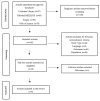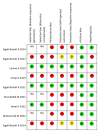Is There Evidence of Crohn's Disease Exclusion Diet (CDED) in Remission of Active Disease in Children and Adults? A Systematic Review
- PMID: 38613020
- PMCID: PMC11013840
- DOI: 10.3390/nu16070987
Is There Evidence of Crohn's Disease Exclusion Diet (CDED) in Remission of Active Disease in Children and Adults? A Systematic Review
Abstract
Crohn's disease (CD) is an inflammatory bowel disease. Previous research has explored the impact of diet on CD, as specific dietary components can influence gut microbiota and immune responses, contributing to damage in the gastrointestinal tract. The Crohn's Disease Exclusion Diet (CDED) is based on an exclusion diet; it is a recent dietary approach that is often used alongside partial enteral nutrition (PEN) and aims to induce disease remission by excluding certain dietary components. This study assesses the current evidence for the effectiveness of the CDED + PEN in achieving remission in both children and adults with active CD. Our systematic review followed PRISMA recommendations and was registered in PROSPERO with CRD number 42022335076. The searched databases were PubMed/MEDLINE, Cochrane Library, Scopus, and Web of Science. The included studies were analyzed using Rayyan software, and the risk of bias was assessed with Cochrane RevMan 5.0 software. The primary assessed outcome was clinical remission, evaluated with validated questionnaire scores such as PCDAI, CDAI, or HBI. All analyzed papers yielded promising results. Notably, the CDED + PEN demonstrated better tolerance than exclusive enteral nutrition (EEN), resulting in higher adherence rates. Therefore, the CDED + PEN appears to be a viable alternative for induction remission in active disease for both children and adults with CD.
Keywords: Crohn’s disease; Crohn’s disease exclusion diet; exclusive enteral nutrition; partial enteral nutrition; remission.
Conflict of interest statement
The authors declare no conflict of interest.
Figures




References
-
- Van Assche G., Dignass A., Panes J., Beaugerie L., Karagiannis J., Allez M., Ochsenkühn T., Orchard T., Rogler G., Louis E., et al. The second European evidence-based Consensus on the diagnosis and management of Crohn’s disease: Definitions and diagnosis. J. Crohn’s Colitis. 2010;4:7–27. doi: 10.1016/j.crohns.2009.12.003. - DOI - PubMed
Publication types
MeSH terms
LinkOut - more resources
Full Text Sources
Medical

